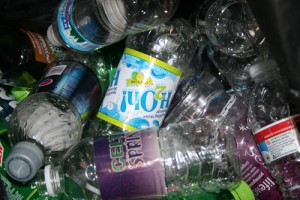
That bottle of Aquafina you saw on the ground this morning was near the end of an incredibly long journey. Starting out as perfectly benign tap water, it went through a redundant and energy-intensive purification process before being shipped hundreds, perhaps thousands, of miles to get to that cooler in the Grill. From there it was finished in a few gulps and carelessly dropped on the ground to let nature sweep it along its wayward path.
“Sure, that’s a sad story, but I never litter,” you may say. The truth is, however, most disposable plastic water bottles end their long journey in a landfill, which is by no means better.
Even here at St. Thomas, most of the disposable plastic water bottles are found in the trash, according to Bob Douglas, coordinator of recycling and central receiving. We dutifully follow the trend that industry research shows: Less than 25 percent of all plastic water bottles are recycled.
In a world where dwindling resources are the cause of international conflict, it seems utterly irresponsible to use oil to extract water from the ground, package it in containers made from more oil and then ship it thousands of miles, using lots more oil, so it can be used and tossed aside without a further thought.
Far too much blood has been spilled for these resources while the industries cash in. Water, a necessary component of life, is too vital to be treated as a commodity to be bought and sold.
But Aquafina tastes great, so we’ll cut it some slack.
St. Thomas should follow the University of Portland in eliminating disposable plastic water bottles sold on campus, and students have the power to make this happen.
First, stop buying water in disposable plastic containers. You vote to continue this system with every dollar you spend. Instead, fill a reusable bottle with water from the fountain. Minnesota has some of the cleanest water in the world, but if you are still concerned with quality, find a Brita pitcher, which is cheap and easy to refill.
Second, educate yourself. There is a plethora of information online at your fingertips. Check out water statistics from the United Nations and read up on issues such as water privatization and availability of clean drinking water.
Finally, engage the university in this effort because change doesn’t happen on its own. The administration is more concerned with its pocketbook than being a leader, which is why this has to be a student initiative. There are many university officials who would love to see this happen, but need student support. Check out sustainability-oriented clubs like Green Team, Students for Justice and Peace and Engineers for a Sustainable World, or see what your own club can do to make this happen.
By rallying around this cause, we can show the community that St. Thomas is not a place full of irresponsible, self-centered students, but a university brimming with committed citizens and bold leaders. Standing hand in hand, we have the power to achieve anything we imagine.
Aaron Hays can be reached at hays2206@stthomas.edu.



Banning plastic bottles is a good way to become more sustainable. However, as an employee at the St. Thomas Recycling Center, I can say that there are other problems we should be trying to fix. Styrofoam cups are still readily available on campus. We are unable to recycle Naked juice. In fact, a very large portion of our garbage from recycling is Naked juice containers. Plastic soda cups also cannot be recycled. And those 10%-recycled-material Starbucks cups? Nope (seriously, stop trying). Anyone can make a difference. Bring your own mug/container, Refuse to buy non-recyclable containers. You vote on this issue with every dollar you spend.